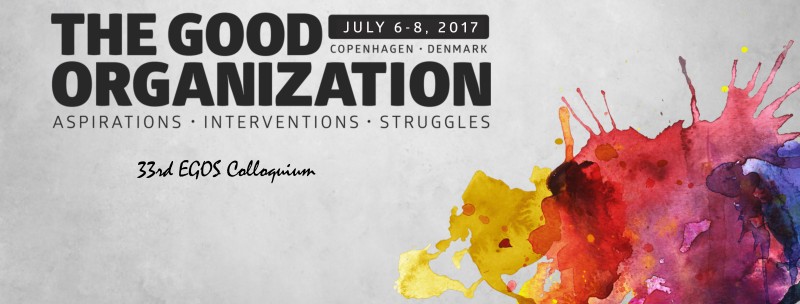Sub-theme 68: Dynamics of Practices, Knowledge and Work in Healthcare Organizations
Call for Papers
This sub-theme invites submissions from scholars interested in the study of dynamics of practices, knowledge and learning,
institutional change or other types of transformations in the field of healthcare. Healthcare organizations have traditionally
been established to pursue the common good. However, contradictory conceptions exist of what this common good may be. As a
result, healthcare organizations are inherently sites of aspiration and intervention, but also one that are characterized
by tension and struggles. These conditions are exacerbated by a regime of resource scarcity within which most of these organizations
increasing operate. We welcome empirically driven work that examines how these new conditions manifest in the daily practices
of organizing, for example in the production and circulation of knowledge and ideas, the introduction of innovative processes,
artefacts and arrangements, the re-negotiation of professional relationships and boundaries, and the emergence of new regimes
of knowing and learning.
Healthcare organizations, from both private and public sectors, have been facing
profound changes over the past decades. On the one hand, changes have been dictated by national authorities with the introduction
of managerial practices focused on increased accountability and efficiency, new governance rules, or the development of cooperation
between different types of health care organizations (e.g. hospitals, primary care, clinics or others) in geographic areas
(Kimberly et al., 2009). On the other hand, the spread of technical innovations such as personalized medicine, telemedicine,
robotic surgery, or the need to better coordinate between hospitals, nursing homes, or day hospitals, have tremendously modified
the way people work in healthcare organizations (Nicolini, 2010; Swan et al., 2016). However, instilling institutional changes
into working practices is still a challenge, and need to be further explored, as well as how local practices contribute to
macro level changes (Reay et al., 2006; Tsoukas & Chia 2002).
All these changes have been introduced
with the aim of building “good” healthcare organizations and systems; however, there are very different definitions of what
constitutes good healthcare organizations and healthcare systems; organizations can end up with contradictory pressures to
become or remain “good” organizations. They may be: financially balanced and offer excellent quality of care to everyone and
protect local jobs; or, developing strong expertise in key medical areas while covering a large spectrum of care. In short,
healthcare organizations are inherently sites of aspiration, intervention and pursuit of the common good but are also characterized
by tension, contradiction and struggle.
In this sub-theme we invite submissions from scholars interested
in studying the dynamics of practices (Nicolini 2006), knowledge and learning (Swan et al., 2016), institutional change (Reay
et al., 2013) or other types of transformations in the field of healthcare (Ferlie et al., 2016). In particular, we are interested
in how such dynamics manifest in the unfolding of ordinary work and practices, the production and circulation of knowledge
and ideas, the introduction of innovative processes, artefacts and arrangements, the re-negotiation of professional relationships
and boundaries and the emergence of new regimes of knowing and learning. Practice-based approaches seem particularly appropriate
for such research (Nicolini, 2012) but other empirically grounded ways of looking at these issues are also welcome.
We encourage submissions that capture the detail of activity, work, and performance, and how they have evolved with regards
to the pursuit of being a “good” healthcare organization. We welcome studies that discuss how these ways of doing have traveled
across nations and continents and what sort of empowerment and dis-empowerment effect they produce. We are also interested
in studies that analyze the role of material devices, technologies, and innovations in healthcare and how they relate to activity.
Finally, we also encourage submissions considering the institutional dimension, focusing on practice-based perspectives that
facilitate attention to the role of professions and professionals, the political aspects of decision-making, and the power
issues that structure this field.
Potential questions that could be addressed include:
- What kind of new practices have emerged in the attempt to create “Good” healthcare organizations?
- What does it mean to work and manage in the healthcare sector in the XXI century?
- What new processes of learning and circulation of knowledge and expertise are emerging as a consequence of changes in the field of healthcare?
- What are the consequences of new technologies and medical innovations in practice?
- Where are the main tensions and contradictions? What kinds of struggles or conflicts have arisen? How do actors cope with these situations?
- How have accountability instruments and performance management in healthcare impacted the activity of healthcare professionals?
- What is the impact of inter-organizational cooperation on healthcare practices, learning and knowledge dynamics?
References
- Ferlie, E., Montgomery, K., & Reff Pedersen, A. (2016): The Oxford Handbook of Health Care Management. Oxford: Oxford University Press.
- Kimberly, J., de Pouvourville, G., & d’Aunno, T. (2009): The Globalization of Managerial Innovation in Health Care. Cambridge: Cambridge University Press.
- Nicolini, D. (2006): “The work to make telemedicine work: A social and articulative view.” Social Science & Medicine, 62 (11), 2754–2767.
- Nicolini, D. (2010): “Practice as the Site of Knowing: Insights from the Field of Telemedicine.” Organization Science, 22 (3), 602–620.
- Nicolini, D. (2012): Practice Theory, Work and Organization. An Introduction. Oxford: Oxford University Press.
- Reay, T., Chreim, S., Golden-Biddle, K., Goodrick, E. Williams, B.E., Casebeer, E., Pablo, A. & Hinings, C.R. (2013): “Transforming New Ideas into Practice: An Activity Based Perspective on the Institutionalization of Practices.” Journal of Management Studies, 50 (6), 963–990.
- Reay, T., Golden-Biddle, K., & Germann, K. (2006): “Legitimizing a new role: Small wins and micro-processes of change.” Academy of Management Journal, 49 (4), 977–998.
- Swan, J., Newell, S., & Nicolini, D. (eds.) (2016): Mobilizing Knowledge in Healthcare: Challenges for Management and Organization. Oxford: University Press.
- Tsoukas, H., & Chia, R. (2002): “On Organizational Becoming: Rethinking Organizational Change.” Organization Science, 13 (5), 567–582.


